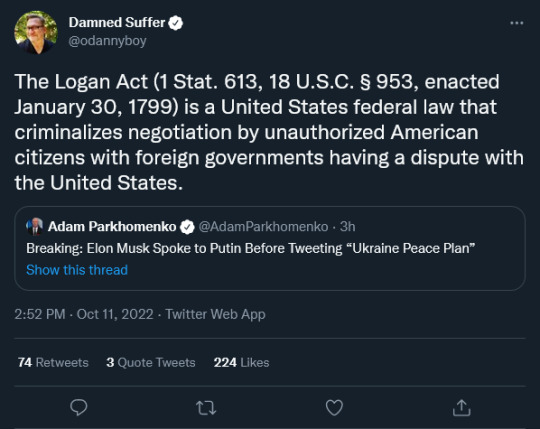#ian bremmer
Text
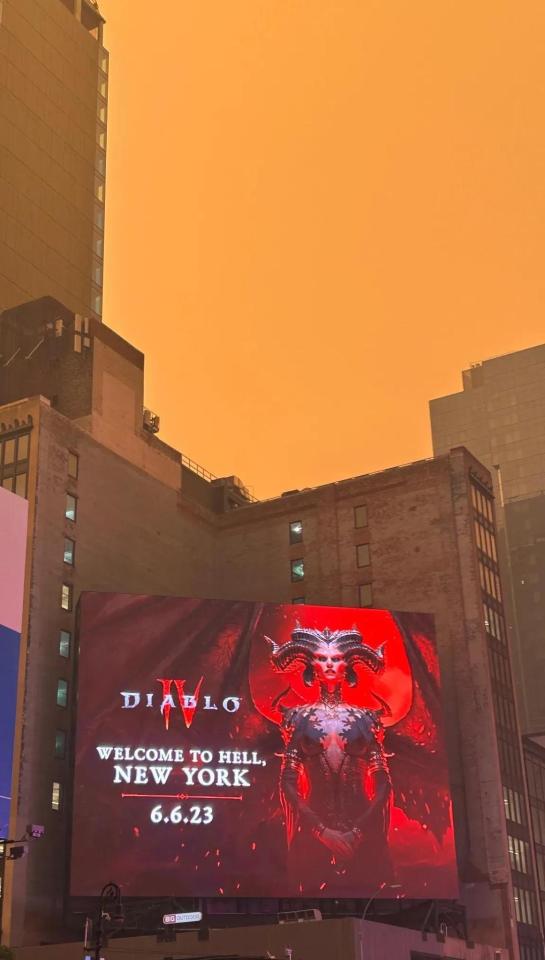
H/t @Bremmerian :: [Robert Scott Horton]
* * * *
“The gates of hell are open night and day;
Smooth the descent, and easy is the way:
But to return, and view the cheerful skies,
In this the task and mighty labor lies.”
― Virgil, The Aeneid
62 notes
·
View notes
Text
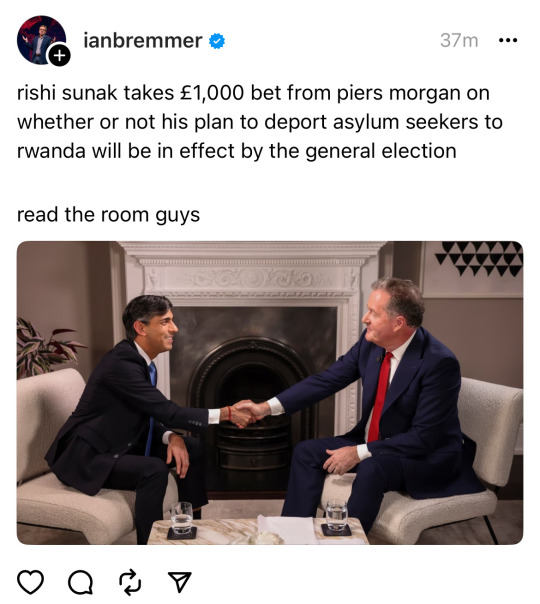
#ian bremmer#political threads#rishi sunak#piers morgan#rwanda migration plan#uk immigration#uk news#uk politics#conservative party
13 notes
·
View notes
Text
“Analysts have expressed concerns that relations between Serbia and Kosovo — tense at the best of times — have become increasingly hostile in recent months. Violence erupted in northern Kosovo in September, and Belgrade responded with a military buildup on its border with its neighbor.
Now there are concerns that the volatility in this southeastern region of Europe could tip into an armed conflict while the world is distracted by the war in Ukraine.
(…)
"Resolving the dispute between Kosovo and Serbia is no longer just a political matter, but a serious security issue for the region and for Europe," Engjellushe Morina and Majda Ruge, senior policy fellows at the European Council on Foreign Relations (ECFR), wrote last week.
"For the U.S. and EU, the choice is no longer just between the failure and success of the dialogue but between stability and a further escalation of violence. The latter is most likely unless they finally acknowledge Belgrade's role in destabilising Kosovo and adopt a robust approach to counter it."
(…)
Northern Kosovo, which borders Serbia, has an ethnic Serb majority whereas the country as a whole is around 93% ethnic Albanian. Serbian capital Belgrade does not recognize its neighbor as an independent state.
A key recent tipping point was local elections in the spring that saw ethnic Albanians elected to a number of municipalities in northern Kosovo. The results caused outrage among the ethnic Serb community in the region who had boycotted the votes, saying their demands for more autonomy had not been met.
Tensions ratcheted up further over the summer and erupted in late September following a shootout between a heavily armed group of ethnic Serbs and Kosovo special police forces in the northern Kosovo village of Banjska in which one police officer and three gunmen were killed.
NATO has had a peacekeeping mission in Kosovo since 1999 following a bloody conflict between ethnic Albanians opposed to ethnic Serbs and the government of Yugoslavia in 1998. The military alliance reacted to the September incident by deploying additional peacekeeping troops to the region, while Serbia bolstered its military presence along its border with Kosovo.
(…)
"From zero land wars in Europe, we could conceivably be looking at two very shortly," Ian Bremmer, founder of the Eurasia Group, said in a note Monday.
He likened the tensions to the recent lightning-fast conflict between Armenia and Azerbaijan, which culminated last month with the Azerbaijani military seizing the disputed region of Nagorno-Karabakh in a rapid offensive with little outside intervention.
"You have a long-simmering and unsustainable status quo being challenged by the dominant military, looking to see if anybody else cares enough to intervene," Bremmer said.
"In this case, that's NATO — less distracted than Russia, and much more likely to intervene directly — but the prospects of an invasion have gone way up over the past few days."
(…)
Tensions between Serbia and ethnic Albanians culminated in the 1998 Kosovo war between Yugoslav forces, led by Serbia, and a Kosovo-Albanian rebel group known as the Kosovo Liberation Army, who opposed the Serbian authorities and oppressive policies of Serb leader Slobodan Milošević.
Hundreds of thousands of Kosovo Albanians were displaced by the conflict and numerous war crimes were committed by both sides, although the majority were attributed to Serbian and Yugoslav government forces.
The conflict ended when NATO intervened in 1999, launching air strikes on Yugoslav armed forces until their withdrawal from Kosovo. NATO's aerial bombing campaign remains controversial to this day although it is credited with bringing the war to an end.
Kosovo declared itself independent from Serbia in 2008, a proclamation that Serbia rejected, and tensions have simmered ever since, not helped by the election of nationalist leaders in both Serbia (President Vučić) and Kosovo (Prime Minister Albin Kurti).
Nonetheless, Serbia has aspirations to join the EU and is unlikely to want to jeopardize this, or to tempt a direct response from NATO, according to Andrius Tursa, Central and Eastern Europe advisor at risk consultancy Teneo.
"A direct military offensive by the Serbian army on northern Kosovo is very unlikely due to the presence of NATO peacekeepers and the risk of punitive Western sanctions as a result of such action," Tursa said in a note Tuesday.”
“An armed band of Serb militants recently ambushed police in Kosovo. In the resulting firefight and retreat, four people — including a police officer — died from their wounds.
The incident sparked official recriminations from both Kosovo and Serbia, culminating in Serbia moving its armed forces towards the countries’ shared border only to subsequently withdraw them due to pressure from the United States.
Tensions between the two countries are nothing new. Serbia and Kosovo were previously united under Yugoslavia. The collapse of the country in the 1990s, however, caused Kosovo to push for independence.
Kosovar forces, backed by NATO, expelled the remnants of the Yugoslav army in 1999. Kosovo, however, remains central to Serbian national identity and Serbia has never truly reconciled itself to Kosovo’s independence.
(…)
The overthrow of former Serbian president Slobodan Milosevic in 2000, and the EU identifying Serbia as a candidate for expansion to join the union in 2003, provided Serbian politicians with an alternative policy to the nationalism of the past.
Serbia officially submitted its application to ascend to EU member status in 2009. Unfortunately, Serbia’s progress towards that goal has been painfully slow.
Slovenia and Croatia, two other former Yugoslav states, ascended to the EU in 2004 and 2013, respectively. From formal submission to full member status took each country 10 years or less.
Serbia’s application, now in its 14th year, shows no sign of being formally processed as it fails to meet many of the judicial, economic and political standards the EU requires for membership.
Serbia has made several gestures towards achieving EU membership. Most notably, it agreed to a plan to normalize relations with Kosovo. For many Serb nationalists, the question of Kosovo’s independence elicits visceral reactions due to Kosovo’s prominence in Serb nationalist identity.
(…)
In Serbia, EU membership remains a distant possibility that will probably only benefit future generations. Today, Serbians are seeking alternate ideologies that promise more immediate returns.
Given the EU’s association with liberal democracy and globalism, some Serbs are embracing populism and anti-western nationalism.
(…)
The EU’s problem is that its domestic and international problems not only limit the ability to deal with Serbia, but Serbia-Kosovo tensions magnify the EU’s own issues. Hungary’s Viktor Orban, for example, has already stated his country — an EU member — would veto any sanctions against Serbia.
Serbia’s provocations against Kosovo also provide Russia with a potential wedge issue in its efforts to divide the EU, as demonstrated by Orban’s statement.
EU support for Ukraine is already facing challenges from members like Slovakia. The EU’s failure to deal with Serbia in the past will only stoke such challenges, and further inhibit the organization’s ability to respond to crises like Ukraine.”
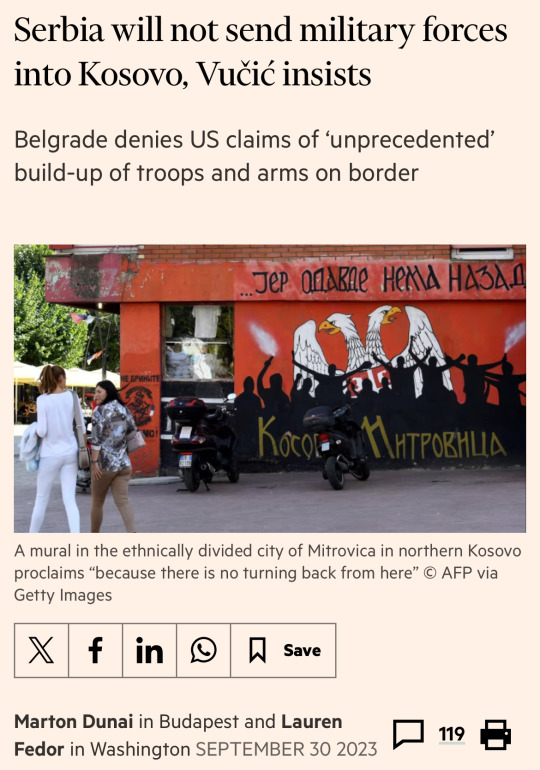
“On Friday White House National Security Council spokesperson John Kirby said the US had observed an “unprecedented staging of advanced Serbian artillery, tanks and mechanised infantry units” on the Kosovo border and called it a “very destabilising development”.
“We are calling on Serbia to withdraw those forces from the border and to contribute to lowering the temperature and the tension,” Kirby said, adding that Vučić and Antony Blinken, US secretary of state, had spoken about ways to defuse the situation.
International efforts to cool the tensions have mounted in recent days after a violent stand-off near a monastery in the Serb-majority north of Kosovo left at least four people dead, including a Kosovo police officer.
(…)
In a statement late on Saturday, the government of Kosovo said the Serbian army had indeed placed extra troops and equipment in 48 military and police bases within a few kilometres of the Kosovo border.
“In this placement, the placement of anti-air and heavy artillery is included… These bases serve to support possible military aggression against the Republic of Kosova,” the Pristina government said.
It demanded that Serbia “immediately withdraw all military troops from the border and close and demilitarise the bases, which pose a permanent threat to our country.””
#kosovo#serbia#balkans#balkanization#yugoslavia#war#wwiii#world war 3#russia#ukraine#european union#eu#europe#ian bremmer
4 notes
·
View notes
Text
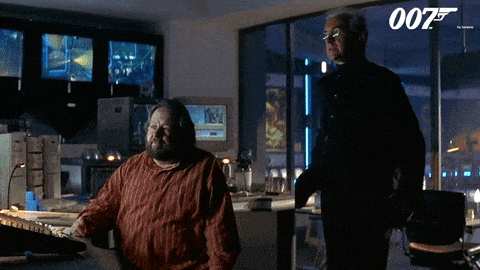
The Ukraine’s ability to communicate with forces operating behind enemy lines is dependent upon one person.
A billionaire who fancies himself…
10 notes
·
View notes
Text
youtube
The Next Global Superpower Isn't Who You Think | Ian Bremmer, June 14, 2023
Who runs the world? Political scientist Ian Bremmer argues it's not as simple as it used to be. With some eye-opening questions about the nature of leadership, he asks us to consider the impact of the evolving global order and our choices as participants in the future of democracy.
TED
#Cold War#USA#China#authoritarianism#war#Russia#Ukraine#politics#corporations#late stage capitalism#capitalism#technology#economics#democracy#information#data#Ian Bremmer#TED#globalization#government#social media#geopolitics#militarism#NATO#TED Talks#resources#diplomacy#media#digital#accessibility
2 notes
·
View notes
Text
youtube
Quality in.
0 notes
Text
Just noticed…
IAN ARTHUR BREMMER
Dunno if I simply haven’t noticed that Bloomberg TV has been automatically including everyone’s middle name in the “Later Today” notification onscreen…or it’s something new. Yes – I don’t care either. Maybe that’s been standard for the couple decades I’ve been a viewer…since I retired?
Reasonably unimportant.

View On WordPress
0 notes
Photo

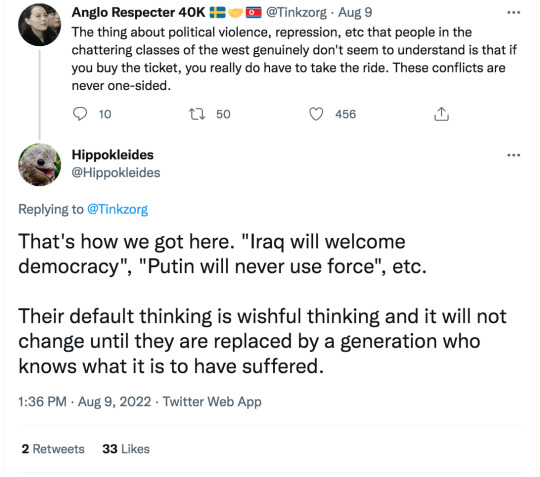
(link)
1 note
·
View note
Text
their lights come together
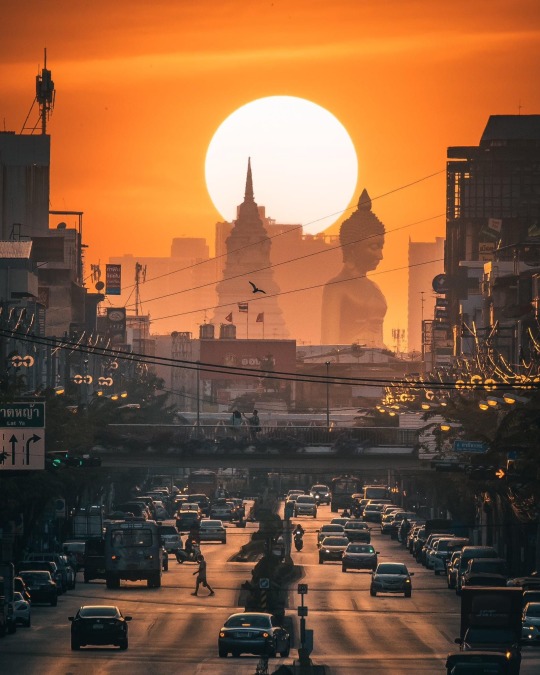
incredible shot of phra buddha ket mongkhon in bangkok
[Ian Bremmer]
* * * *
“There is a light over every person, and when two souls meet, their lights come together, and a single light emerges from them to feel the universal generation as a sea, and oneself as a wave in it.”
― Martin Buber
38 notes
·
View notes
Text
youtube
Who runs the world? Political scientist Ian Bremmer argues it's not as simple as it used to be. With some eye-opening questions about the nature of leadership, he asks us to consider the impact of the evolving global order and our choices as participants in the future of democracy.
+++++++++++
It has already become difficult for us to accept the concept of democracy, considering that for some time now, rulers are not actually chosen for their administrative abilities, but for their influence. The fact is that "democracy" is, in practice, a choice exercised by the owners of financial power, enhanced with the rise of bigtechs
0 notes
Text
Happy Birthday to Tom Riddle aka Voldemort
Richard Bremmer: Voldemort flashback Halloween 1981 and train station shade (SS/PS &DH2)
Ian Hart: Quirrell's second face Mordrake style (SS/PS)
Christian Coulson: Diary Tom (CoS)
Ralph Fiennes: Ressurrected Voldemort (GoF-DH2)
Hero Fiennes-Tiffin: 11 year old Tom (HBP)
Frank Dillane: Teenage Tom in Slughorn's memoried (HBP)





13 notes
·
View notes
Text
szoval musk meghallotta putyin felteteleit, majd ezeket eloadta mint egy "kompromisszumos javaslat"
28 notes
·
View notes


